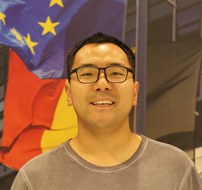Dr. Yang Lu
 © privat
© privat
Research Group Leader
NameMr Dr. Yang Lu
Send encrypted email via the SecureMail portal (for TUD external users only).
Visiting address:
Walther-Hempel-Bau, HEM 110 Mommsenstr. 4
01069 Dresden
WORK BIOGRAPHY
Yang entered Shanghai Jiao Tong University to study chemistry through the Chemistry Olympiad and received a bachelor's degree in polymer chemistry in 2015. Then he moved to Peking University, where he obtained his Doctorate in Organic Chemistry in August 2020, under the supervision of Prof. Jian Pei. In October 2020, he joined Prof. Xinliang Feng’s group as a Postdoctoral Researcher at Technische Universität Dresden and Max Planck Institute of Microstructure Physics.
ACADEMIC EMPLOYMENT
- 10/2020 – 07/2022: Postdoctoral researcher, Chair of Molecular Functional Materials, Technische Universität Dresden, Germany.
- 08/2022 – 07/2023: Postdoctoral researcher, Max Planck Institute of Microstructure Physics, Halle, Germany.
- 7/2023 – present: Marie-Curie Fellow, University of Strasbourg, France.
RESEARCH INTERESTS
Yang focuses on the precise chemistry of functional conjugated MOF and coordination polymers at multiscale, building upon a multidisciplinary approach involving chemistry, physics, material science, and electronics. Specifically, he aims to use synthetic chemistry to address cutting-edge challenges in functional coordination materials. Utilizing a profound comprehension of the structure-property relationship, his endeavor is to advance the creation of novel functional materials and devices, possessing captivating optical, thermal, electrical, and magnetic traits. His ongoing research pursuits encompass two primary directions: (1) Conjugated two-dimensional MOFs, and (2) Organic quantum materials.
SCIENTIFIC ACHIEVEMENTS & RECOGNITION
Full publication list
https://scholar.google.com/citations?user=xXHZBIcAAAAJ&hl=zh-CN
Key publications:
- 1. Lu Y, et al. Precise tuning of interlayer electronic coupling in layered conductive metal-organic frameworks. Nature communications, 2022, 13, 7240.
https://www.nature.com/articles/s41467-022-34820-6 - 2. Lu Y, et al. sp‐Carbon Incorporated Conductive Metal‐Organic Framework as Photocathode for Photoelectrochemical Hydrogen Generation. Angewandte Chemie International Edition, 2022, 61, e202208163.
https://onlinelibrary.wiley.com/doi/full/10.1002/anie.202208163 - 3. Lu Y, Wang J Y, Pei J. Achieving efficient n-doping of conjugated polymers by molecular dopants. Accounts of Chemical Research, 2021, 54, 2871.
https://pubs.acs.org/doi/full/10.1021/acs.accounts.1c00223 - 4. Lu Y, et al. Persistent conjugated backbone and disordered lamellar packing impart polymers with efficient n‐doping and high conductivities. Advanced Materials, 2021, 33, 2005946. https://onlinelibrary.wiley.com/doi/full/10.1002/adma.202005946
- 5. Lu Y, et al. The critical role of dopant cations in electrical conductivity and thermoelectric performance of n-doped polymers. Journal of the American Chemical Society, 2020, 142, 15340.
https://pubs.acs.org/doi/full/10.1021/jacs.0c05699 - 6. Lu Y, et al. Rigid coplanar polymers for stable n‐type polymer thermoelectrics. Angewandte Chemie International Edition, 2019, 131, 11512.https://onlinelibrary.wiley.com/doi/full/10.1002/ange.201905835
HONORS
- 2023 Marie Skłodowska-Curie Actions Postdoctoral Fellowship, ERC
- 2021 CCS-JINGBO Outstanding Doctoral Thesis
- 2020 Beijing Outstanding Graduate
- 2019 Chem Star, Peking University
- 2019 China National Scholarship
- 2015 Shanghai Outstanding Graduate
- 2014 Honored Student Model, Shanghai Jiao Tong University
